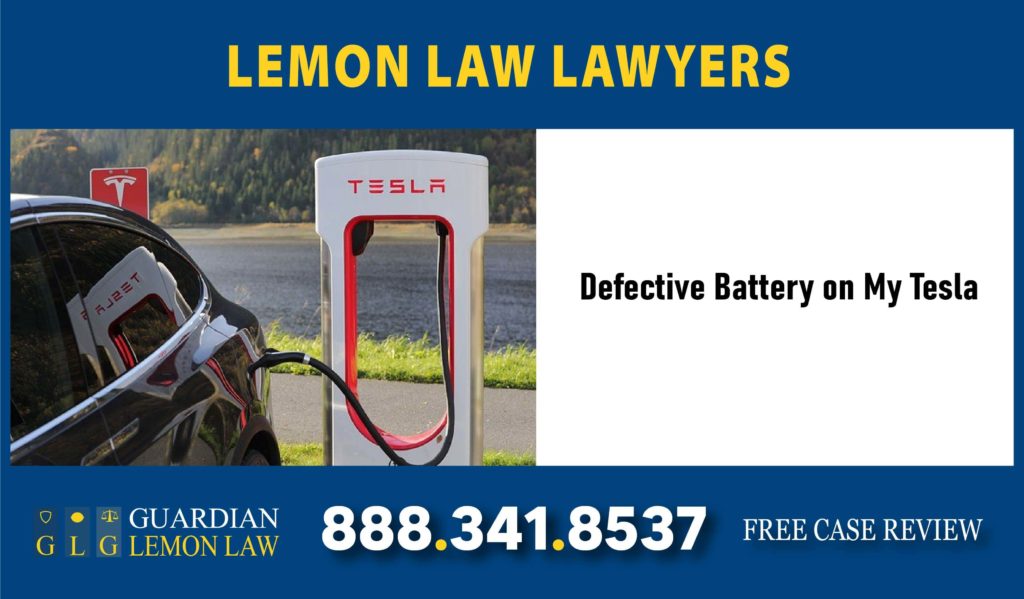About Us
Our legal firm is ready to talk to you about any issues that you have regarding a defective battery on your Tesla. We can go over your claim, as well as look at any losses, expenses, personal injuries or damages that you might have on your vehicle on account of a defective battery. We are here for you 24/7, and can review your claim for damages when you give us a call to discuss your case today, with our knowledgeable attorneys at the Guardian Lemon Law Group.
Manufacturer Defects on Lithium-Ion Batteries Can Be Deadly for Electric Car Owners
Lithium-ion or Li-on batteries are highly dangerous, unlike what most people believe. Many folks assume that an electric battery is “good for the planet,” and therefore must be a modicum of safe when used in an electric car. But the truth about electric car batteries tells a different story. Electric car batteries have a high-level of issues with:
- Necessity of protection for circuits to prevent thermal runaway
- Batteries easily stressed and damaged
- Transportation regulations when shipping in large quantities
- Impossible to rapidly charge at temperatures under freezing (32 degrees Fahrenheit)
- Degradation of energy when stored at high temperatures on high voltages
- High operational temperatures can start flash fires
- High runaway internal cell temperatures
- Difficult to recycle (99% of lead batteries are recycled, by comparison)
If these manufacturer’s defects sound familiar because you experienced them on your vehicle, you can call us at the Guardian Lemon Law Group at 888.341.8537.

What Is “Thermal Runaway” and Why Does It Happen to Lithium-Ion Batteries?
Thermal runaway is the massive overheating of an electric battery. This condition and situation can occur when there is a high-level energy discharge in an electric battery, contributing to:
- High energy discharge and overheating
- Cracking of electrolytes in the first gassing phase
- Decomposition of the separator and anode
- Ignition of flash fires
- Explosion of vapor clouds
- Prone to short circuits
- Stored energy converted to intense heat
- Hydrocarbon combustion likely
- Cracking and flashing of electrolyte
- Smoky gas discharge
- Full battery combusts and explodes
- Li-Ion batteries stored inside of fixed facilities can explode for high fire risks
- Vehicle collisions of an electric battery can cause explosion of the battery
If your Tesla has had an experience with thermal runaway, it can be a scary experience. Your Tesla battery will overheat and practically explode, and will get so searing hot that you run the risk of being seriously injured just being in the same house where it is being charged up. This can be a scary and dangerous scenario. For that reason, you should call us today to let us review your claim with you and for you for free. It is easy to make the call to us right now!
Common Defects on a Lemon Car That Affect Driver Safety on the Vehicle
If you own a Tesla, you might have had the experience of noting different and interlocking defects that are affecting your vehicle. In that case, your Tesla might have other defects associated with driving it, including:
- Headlamps
- Starters
- Instrument panel clusters
- Oxygen sensors
- Has no power assist
- Won’t turn unless the car is moving
- Turns too hard
- Hurts your shoulders to turn the wheel
- Body sealing products
- Electronic powered steering assemblies
- Shock absorbers
- Locks up on you
- Hangs itself up
In the event that you are plagued with many different types of common manufacturer defects on your Tesla, you can call us at the Guardian Lemon Law Group, to get an attorney to review your claim for free. The call is easy for you to make, just give us a ring today.
Attorney Provisions
You do not have to pay us any money up front, before we will start to work on your claim for your Tesla with a defective battery. This makes it easier for you to make the call to us today, and allow us to review your claim for free.
Model Years Affected by Tesla Defective Batteries
The model years affected by a defective battery on a Tesla are 2018 and 2019 model years. Additionally, your new 2023 Tesla can also have a defective battery issue as well. For this reason, you need to give us a call today at the Guardian Lemon Law Group.
How Long Do I Have to File My Lemon Car Claim?
The statute of limitations for a lemon car claim is 4 years, depending on the facts of your lemon car case.
What Are the Tesla Lemon Car Settlement Values?
Your claim will depend on the expenses and damages that you have to declare related to your case. Some claims can settle between $20,000 and $200,000, depending on the specifics of each claim.
How Long Will It Take to Settle My Tesla Lemon Car Claim?
Your Tesla lemon car claim may take around 3-5 months to settle out.
Is My Leased Car Eligible for a Tesla Lemon Car Claim?
Yes, your leased Tesla car with a defective battery is eligible for a lemon car claim. All that you need to do is to call us at the Guardian Lemon Law Group today, to review your claim.
Zero Fee Guarantee
We offer a zero-fee guarantee when you call us today at the Guardian Lemon Law Group. That means that you never have to pay us up front, before we will start to work on your claim.
Contact Us / Free Case Evaluation of a Defective Tesla Battery
A lemon car is not anyone’s idea of a dream vehicle. You can call us at the Guardian Lemon Law Group at 888.341.8537 if you have a defective Tesla electric battery. We can initiate a lawsuit based on the merits of your lemon car claim. We can connect you with a group of attorneys with experience in manufacturer’s defects regarding electric car batteries. Just call us today for information from our legal team regarding your lemon Tesla defective electric battery. We are here for you and have a lawyer with experience in manufacturer’s defects and lemon car cases, to get you the recovery compensation that you deserve in this case.


